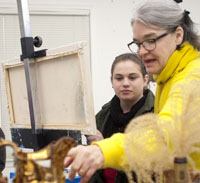Why I Give: Q&A With Martha "Miff" MacLeod '76

Martha "Miff" MacLeod '76
Q: Tell us a little about your life today.
A: I have enjoyed what I have come to call "my second career." I retired from banking, went back to graduate school in my 50s, and since 2010, I have been fortunate to work at the Dallas Museum of Art (DMA) as a curatorial assistant. During my tenure at the DMA I have served alongside curators who work with various parts of our collection. At the moment, I support the curators of Decorative Arts & Design, American Art and Latin American Art, helping them mount exhibitions, acquire new artworks and care for their collections. One of the nice benefits of my job is that I have opportunities to travel for work both domestically and internationally. I've been fortunate to do work at major museums in New York; Chicago; Denver; Washington, D.C.; London; Paris; Frankfurt; Montpellier, France; Basel, Switzerland; and Vienna, Austria. (Vienna was my favorite!) I try to pass two weeks on holiday in Paris each summer, where I can speak the French that I have been studying at the Dallas Chapter of Alliance Francaise.
Q: What is your fondest memory from the College?
A: Sitting in Dr. Fuller's American Painting class the fall of my junior year. I had already developed a deep appreciation for the incredible collection of American paintings that hung in our hallways and classrooms. I particularly recall that Georgia O'Keeffe's "Yellow Cactus" hung in the East trolley. It was in Dr. Fuller's class where I first began to truly develop a deep appreciation for American art and the incredible collection that surrounded me on a daily basis. Today, it gives me immense joy to think of those moments in his class that set my path to where I am today—albeit with a 30-year detour.
Q: What was your favorite tradition?
A: Weirdly, the serenades because I cannot carry a tune. I have such happy memories of singing (badly), arm-in-arm with classmates. "Where the River" still easily brings a tear to my eye.
Q: Why do you support the College with a planned gift?
A: To me, the question really is, "Why would I not support the College?" This is the place where I learned determination, grit, to never give up, and began to find my voice. It is the institution where I learned a lot academically, the place that sparked my interest in art history and where I learned to find a way to tough out the bad times and appreciate the good.
Q: Why is it important for people to give to Randolph?
A: For me, it is important to pay back the College for what I learned not only academically but also personally, and pay it forward to the current and future students of an institution that informed the abundant life that I so enjoy today.
Q: What advice would you give to a new graduate?
A: Don't stop learning, don't give up on your dreams, be bold and have the courage to change your path. To quote the novelist George Eliot, "It is never too late to become what you might have been." If you may indulge me a bit, my advice to current students would be to leave with no regrets. Your four years on campus will fly by with the blink of an eye.
Giving Back as Thanks
You, too, can ensure future students gain the same lifelong gifts of a Randolph College education. To learn more about the many ways to give, contact The Planned Giving Office at 434-485-8050 or plannedgiving@randolphcollege.edu.

